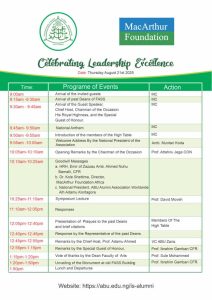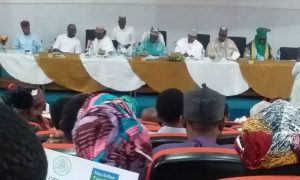The Nigerian university system came under a reflexive scrutiny today at the Ahmadu Bello University, Zaria where deans of the old Faculty of Arts and Social Sciences (FASS) were called to be honoured. Attracting a cream of the society – the Zaria Emirate traditional authority, the university Vice-Chancellor and the MacArthur Foundation which supported the memorialisation – the occasion turned into a nostalgic soul-searching bordering on an unspoken case for a return to the foundational moment.
 Today’s event in Zaria is coming a day after Prof Ibrahim Gambari recalled to his audience at the August 20th, 2025 ‘Evening of Tributes’ for the late Prof Okello Oculi how the old Faculty of Arts and Social Sciences (FASS) was made so popular by a parade of academic stars that its enemies changed the name to FARCE. As speaking is also doing especially if the speakers are high up in power terms, the FASS subsequently degenerated into a sham and shadow of itself as staff departed and the faculty even split.
Today’s event in Zaria is coming a day after Prof Ibrahim Gambari recalled to his audience at the August 20th, 2025 ‘Evening of Tributes’ for the late Prof Okello Oculi how the old Faculty of Arts and Social Sciences (FASS) was made so popular by a parade of academic stars that its enemies changed the name to FARCE. As speaking is also doing especially if the speakers are high up in power terms, the FASS subsequently degenerated into a sham and shadow of itself as staff departed and the faculty even split.
Chaired by Prof Attahiru Jega who caused a stir at the event, Intervention understands it was a full house. Family members of past deans of the faculty represented those who are late now. Presences include representatives of the Emir of Zaria, Prof Ibrahim Gambari, Prof Attahiru Jega, Prof Ahmed Modibbo, Prof Uka Ezenwe, family members of Dr Mahmud Tukur, Prof Abdul Kaita (Chairman of the International Relations Students platform) Dr. Kole Shettima of MacArthur Foundation and many more others.
The event had its own mild drama. When Prof Attahiru Jega was introduced, the MC emphasised his having being Chairman of the Independent National Electoral Commission (INEC) and former Vice-Chancellor. There was no mention of his ASUU leadership, a gap Jega protested, saying he considered that more definitive of him than the ones that the MC was more interested in. The protest sent everyone into a ruckus of laughter but from which the audience managed to quickly recovered and got back to business.
The substantive space was taken by ABU political scientist, Dr. David Moveh, who spoke on “African Academic Excellence: Implications for Politics and Development in Africa” at the maiden symposium to honor the past deans of the former Faculty of Arts and Social Sciences, (FASS), ABU, Zaria at the CBN Centre of Excellence in Samaru, Zaria. The speaker tried to explain what contributed to its decline as well as the implications.
FASS, he said, was a creation of methodological innovations, interdisciplinarity and a culture of debate. Dr. Moveh who is a classic shon- of-the-soil and spoke from that lived experience of being born inside ABU, Zaria where his father worked as a FASS faculty staffer while he attended the university’s secondary school before cited went ahead to prove his thesis.
 For methodological innovation, he cited the decolonial historiography that privileged oral sources as an example. With colonial sources, it meant the subaltern could speak in terms of what happened in the past as against Eurocentric stress on written sources. For inter-disciplinarity, he cited the arrangement whereby irrespective of any student’s major course, s/he could take electives from as divergent disciplines as s/he felt. For debates, he cited the Bala Usman/Bangura engagement on the causes of Nigeria’s economic nightmare. He was categorical that the splitting of the faculty into two had made that unobtainable.
For methodological innovation, he cited the decolonial historiography that privileged oral sources as an example. With colonial sources, it meant the subaltern could speak in terms of what happened in the past as against Eurocentric stress on written sources. For inter-disciplinarity, he cited the arrangement whereby irrespective of any student’s major course, s/he could take electives from as divergent disciplines as s/he felt. For debates, he cited the Bala Usman/Bangura engagement on the causes of Nigeria’s economic nightmare. He was categorical that the splitting of the faculty into two had made that unobtainable.
Other speakers basically agreed with his submission, with Prof Attahiru Jega, for example, saying that identity politics had taken a toll on the university system. People become principal officers of universities, especially Vice-Chancellors, more on where they come from or how they worship God and less on what they can offer, he said. but Jega also fingered the impact of national policies, particularly the Structural Adjustment Programme (SAP) and the different names it kept assuming as culprit. “At the end of the day, the universities were no longer where what happened in FASS of old could happen again”, he said.
Dr. Kole Shettima of MacArthur Foundation credited ABU, Zaria with a legacy of diversity, especially ethnic and religious diversity. There is no state that is not represented at student as well as staff level in ABU, Zaria, he said although Intervention could not ascertain if he was talking of today or yesterday.
Prof Ibrahim Gambari was commended for making possible over 20 ambassadors of mainly his former students in Zaria when he was in the UN system. On the whole, it was a big event as far as critically looking back at FASS as a centre of radical nationalist scholarship required for nation building in an emergent state. Of course, Nigeria is still an emergent state because it has not been able to settle many of the defining variables in state and nation building, an exercise that needs radical academic inputs, going by experiences from the West and, recently, East Asia.
There is no consensus on how Nigeria might not only be able to restore the universities to the heights they attained before the mid-1980s but also shield them from economic and political shocks. The resolution will depend on the balance of forces in the field of knowledge politics in Nigeria involving the Federal Government, private university owners, (I)NGOs, foreign investors, philanthropists and the students.
This story will be updated in the event that more details filter in




























